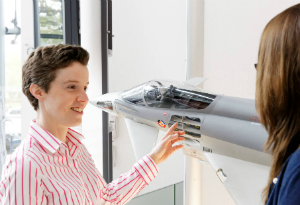Kris Harrison: the award-winning engineer promoting diversity in her industry
- Emma Finamore
- 04 Feb 2016
We caught up with the pioneering woman improving the chances for young people interested in engineering careers, regardless of their gender or background.

Kris Harrison won last year’s Inspiring Young Women Award by WISE (Women in Stem and Engineering), for her work in addressing the lack of diversity in engineering. She is Head of Lean Engineering across the UK and Italy for part of Finmeccanica.
She works as part of a cross-site, multi-national team that looks at continuous improvement within engineering, aiming to promote efficiency and effectiveness, and helping to make her company be more competitive.
A bit of a superwoman, she also leads the outreach programme at our Luton site, working with a team of ambassadors to promote engineering in schools and universities, and helping to improve awareness of the opportunities and careers that it can offer.
She has doubled the number of girls applying for work experience at her company and has boosted interest in engineering careers among less privileged young people and those from underrepresented ethnic backgrounds.
We asked Harrison about her pioneering work; the different ways you can get into engineering; and how she thinks you should all be making more of work experience.
What do you think of the non-university routes for aspiring engineers?
Many of the apprenticeships that are offered by companies are a good way to combine practical training and business experience with academic learning, and all while earning a salary.
The introduction of the degree apprenticeship has even provided an alternative way to obtain a graduate level qualification in engineering.
I think that the vast range of alternatives now available means that it is easier than ever for students to choose the route that’s right for them.
Are there any routes into engineering that our readers might not know about?
One particular route I think worth mentioning is making use of work experience or extended placements. These can help students to find out more about engineering, build links within a company and develop skills and knowledge that they can use in their future career.
Impressing during a placement might even help to secure an apprenticeship or graduate position.
Congratulations on your WISE Inspiring Young People award! What work resulted in your award?
For the last four years, I’ve led the outreach programme at our Luton site, assembling a team of about fifty ambassadors. By working with a variety of schools, universities and educational organisations, we’ve created and delivered tailored activity days, a project-based work experience programme, engineering master classes and careers skills sessions.
As well as developing the mix of partnered schools to attract more pupils from different socio-economic backgrounds and ethnicities, I have made a concerted effort to show female students why engineering is a career path worth considering.
For example, last year I organised National Women in Engineering Day activities on three of our sites, giving primary school girls an insight into engineering.
Over the last four years, the number of girls taking part in the work experience programme has risen by 250%, as has the number of girls applying for summer placements.
Why do you think it’s important to encourage young women into the industry?
To succeed in the future, the engineering industry needs to attract more people to work on the technology and global challenges that we face.
There are a lot of young women who would be ideally suited to an engineering career, but who have never considered it, so it’s important to make them aware of the opportunities.
If female engineers can go out into schools and talk to young women, the students can see people who are a bit like them - people to aspire to and relate to – and it really helps them say: “I could do that job”.
By encouraging young women to work in engineering, it helps to add diversity to teams, which in turn gives different ideas, as well as different approaches to things.
A lot of engineering is about problem solving and when you have different viewpoints on a problem you often get to a solution more quickly.
What advice do you have for young people thinking about a career in engineering?
When thinking about a career, I would advise young people to find something that they enjoy and something that interests and excites them.
For young women in particular I would say: “Have confidence in yourself and your abilities – you will have more to offer than you probably realise.
“If you think you want to be an engineer, just go for it: there has never been a better time to be an engineer!”
News
- A day in the life of a Robins & Day business apprentice
- National Apprenticeship Week: from banking apprentice to bank manager
- Why I Chose My School Leaver Programme In Engineering
- How a Gowling WLG apprenticeship could be your route into a law career
- Professional Qualifications in Accountancy: Need to Know
- Why I Chose a School Leaver Programme in Retail
- Who is Young Woman Engineer of the Year?
- PepsiCo Crowned Apprentice Team of the Year
- Why Wannabe Accountants should think about a School Leaver Programme
- “The best element of the apprenticeship is the opportunity to work whilst learning”: Legal apprentice Jonah Kelly on life at Kennedy’s